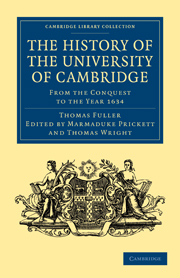Book contents
- Frontmatter
- THE EDITOR'S PREFACE
- HISTORY OF THE UNIVERSITY OF CAMBRIDGE SINCE THE CONQUEST
- Dedication
- PREFACE
- REVERENDISSIMO ANTISTITI, JACOBO USSERIO, ARCHIEPISCOPO ARMACHANO, Domino suo colendissimo
- SECTION II
- DOMINO GULIELMO PASTON, DE PASTON IN COM. NORF. EQUITI AURATO, Patrono meo colendissimo
- SECTION III
- ROULANDO LITTON, In pago Hertfordensi Armigero
- SECTION IV
- RADULPHO FREEMAN, In Comitatu Hertfordensi Armigero
- SECTION V
- EDV. BENLOSSIO, Armigero, Mecænati suo benevolo
- SECTION VI
- EDVARDO PALMER, DE WALTHAM ARMIGERO
- SECTION VII
- TO FRANCIS ASH, Of London, Esquire
- SECTION VII
- THOMÆ PLAYER Armigero, Camerarii Londinensis primogenito
- SECTION VIII
- A PRAYER
- INDEX
SECTION VII
Published online by Cambridge University Press: 05 March 2012
- Frontmatter
- THE EDITOR'S PREFACE
- HISTORY OF THE UNIVERSITY OF CAMBRIDGE SINCE THE CONQUEST
- Dedication
- PREFACE
- REVERENDISSIMO ANTISTITI, JACOBO USSERIO, ARCHIEPISCOPO ARMACHANO, Domino suo colendissimo
- SECTION II
- DOMINO GULIELMO PASTON, DE PASTON IN COM. NORF. EQUITI AURATO, Patrono meo colendissimo
- SECTION III
- ROULANDO LITTON, In pago Hertfordensi Armigero
- SECTION IV
- RADULPHO FREEMAN, In Comitatu Hertfordensi Armigero
- SECTION V
- EDV. BENLOSSIO, Armigero, Mecænati suo benevolo
- SECTION VI
- EDVARDO PALMER, DE WALTHAM ARMIGERO
- SECTION VII
- TO FRANCIS ASH, Of London, Esquire
- SECTION VII
- THOMÆ PLAYER Armigero, Camerarii Londinensis primogenito
- SECTION VIII
- A PRAYER
- INDEX
Summary
A. D. 1563-64. 6 Elizabeth, August 5.
Queen Elizabeth comes to Cambridge.
Queen Elizabeth, partly to ease herself with some recreation, partly to honour and encourage learning and religion, came to Cambridge, where she remained five whole days, in the lodgings of the Provost of King's College. She was entertained with comedies, tragedies, orations, (whereof one most eloquent) made by William Masters (the Public Orator), disputations, and other academical exercises. She severally visited every house; and at her departure she took her leave of Cambridge, with this following oration:
Her oration to the University.
Aug. 10.
Etsi fœeminilis iste meus pudor (subditi fidelissimi et academia charissima) in tanta doctorum turba illaboratum hunc sermonem et orationem me narrare apud vos impediat: tamen nobilium meorum intercessus, et erga academiam benevolentia me aliqua proferre invitat. Duobus ad hanc rem stimulis moveor. Primus est bonarum literarum propagatio. Alter est vestra omnium expectatio. Quod ad propagationem spectat, unum illud apud Demosthenem memini; superiorum verba apud inferiores librorum locum habent, et principum dicta legum authoritatem apud subditos retinent. Hoc igitur, vos omnes in memoria tenere velim, quod semita nulla praestantior est sive ad bona fortunse acquirenda, sive ad principum gratiam conciliandam, quam graviter (ut coepistis) studiis vestris exhibeatis operam: quod ut faciatis vos omnes oro obsecroque. De secundo stimulo vestra nimirum expectatione hoc unum dico me nihil libenter praetermissuram esse, quod vestrse de me animae benevolye concipiunt cogitationes. Jam ad academiam venio.
- Type
- Chapter
- Information
- The History of the University of CambridgeFrom the Conquest to the Year 1634, pp. 261 - 303Publisher: Cambridge University PressPrint publication year: 2009First published in: 1840

